Training and Placement Office has only gained importance over the years. The NAAC and NBA accreditation also gives due stress on the industry placement record while ascertaining the rating.
About how important it is for a college and specifically for a student to have the right officer at its place. These potent officers have a significant impact within the college campus and are playing a strong role in shaping the student’s precious career. Just give a full read to understand better!
- WORDS:3294
- TYPE:Post
- VIDEO:1
- SLIDES:None
- TOPIC:Humans Of EdTech
- TIME:18 Minutes
Hi, welcome to another episode of the Humans of EdTech. In this particular episode, I’ll be sharing with you the types of people whom I have come across while doing my work in GreyAtom, and specifically in the campus segment, more specifically, are repeating all the types of training placement officers, just to be absolutely crystal clear. This is not a satire, sarcasm, criticism, or any kind of, you know, pointing fingers.
On the flip side, this is all about celebrating this particular segment of heroes of people who essentially work with a lot of activity, operations, initiative to make sure they get results for their colleges, and essentially helping a person who’s outside of this particular ecosystem to understand how and what is the taxonomy, or the hierarchy of people typically at play over here.
This is not a condescending video at all, this is something that has a very strong information value for anyone for any EdTech company who wants to venture to reach out to interact with this segment.
And just to get some basic understanding, I just want to reinforce over here, I spent close to a year interacting with trained police officers across the state of Maharashtra, and even beyond, and have formed some really strong relationships, professional and personal and lifelong. So here is more of a celebration, which brings to you a very clear educational value with respect to what is it that you may expect when you go and visit some of these colleges?
The taxonomy of the Training Placement Officer.
Without any further ado, let’s just quickly jump into it. So this is where we come to the taxonomy of training and placement officers. I could have written types of training and placement officers but just want to be slightly specific.
A perspective which is very easy and something I can share for the last 12 months. And that’s what I’m trying to say it’s a fact based summary. Let’s quickly jump into this.
Full time V/S Additional Charge
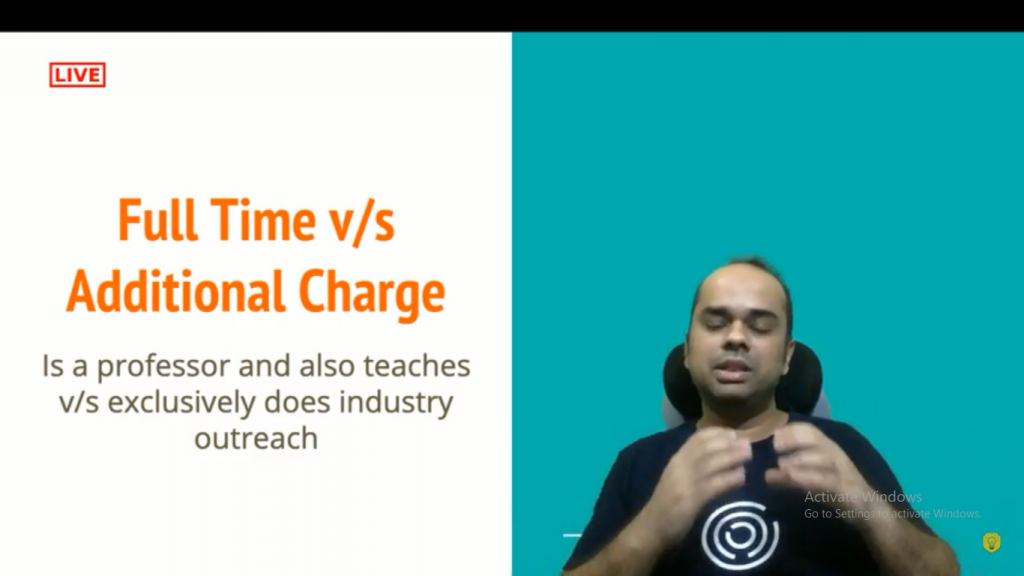
The number one thing that you see, when you come across some of the training and placement officers there are people who are essentially calling out additional charges. What typically means is that you will come across a visiting card which reads B. Tech mechanical, M. Tech Metallurgy has done his/her Ph.D. and the person calls out in the designation training placement officers and in bracket additional charge.
So essentially, they are professors who are doing a full time Professor responsibility they may have BTech and MTech students possibly also even doctoral candidates who are reporting into them and they are doing training placement office they’re handling this particular office in their extended capacity, but essentially you don’t want to either commit to it or at recruiting placement officer or something to that effect.
On the flip side, you will have someone who’s a full time training placement officer, the role in life, the mandate in life is training and placement. And they are purposely hired on board for this one particular role and they have a very well defined set of mandates typically the range of activities, mandates targets people take on is slightly different.
Team v/s Solo
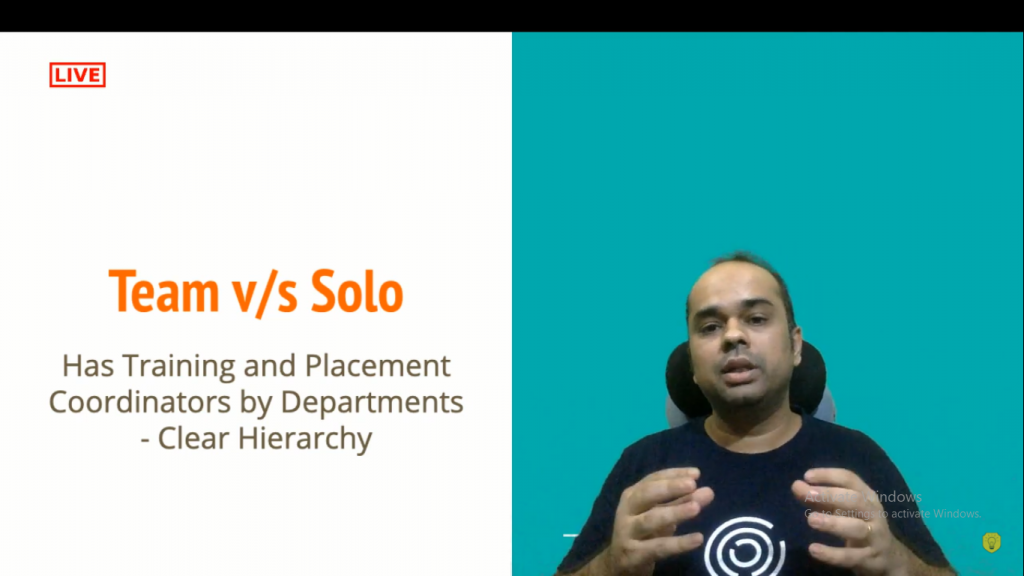
So when you go to any of these colleges, in any part of the country, you will have colleges with multiple disciplines, multiple degrees and departments. So each of these departments will have their training placement coordinator, and each department in effect will have their own student training placement coordinator.
So there is a faculty trained placement coordinator there is a student train placement coordinator. So typically you’re looking at a three tier architecture where there’s a central team, where you have training placement officers and a full team of training placement officers.
And then you have an extended team assigned across different disciplines of training placement coordinators, faculty placement coordinators, and then you have the student training placement officers.
There are colleges where you have one training placement officer and the rest of the structure may be completely non-existent or it may be existent but extremely dormant, where the gateway to the college is through a single person or a single office.
In some of the colleges on the flip side will have a training placement office which is vibrant. But at the same time the training placement coordinators are equally active and they are sourcing opportunities, jobs roles for their departments in a very vibrant way.
Typically, if your college has civil, production, chemical, where the requirement in the market is very niche, the kind of companies that come for electronics, electrical, IT, CS and on the flip side I think you might see something like this, where there is a higher degree of decentralisation.
Responsibilities of the TPO
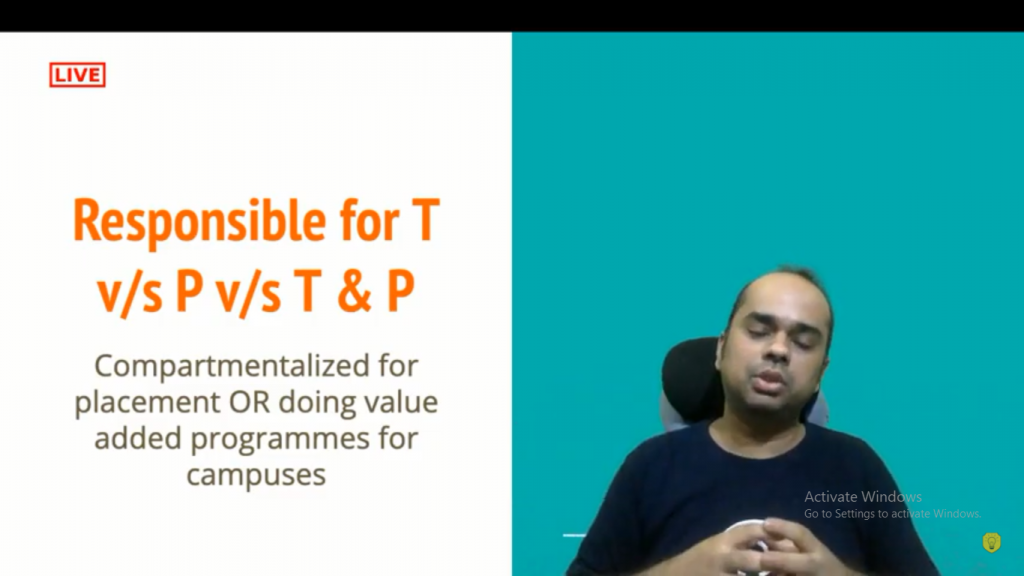
The next is you will come across some training placement officers where people have a more training orientation, where they essentially would be, you know, talking to students right in the first year, second year, third year, fourth year, and they will be having a very structured onboarding training kind of plan.
Or they have more of a placement orientation, where they’re looking at people and getting their place. And there are more outbound in nature, where they will be reaching out to industry partners, getting more companies on the campuses, that kind of thing, I finally there is a mix of both, or rather focus on both.
So there’s nothing inherently right or wrong. But again, you come to see that this training placement officer is very training focused, and they’re very much you know, let’s get people ready from year two to start conducting seminars and all versus you see college or a chain of colleges, where you see that these people are placement focus and think how do I get more and more companies and they’re crafting experiences for recruiters that come to their campuses.
Do they have a budget?
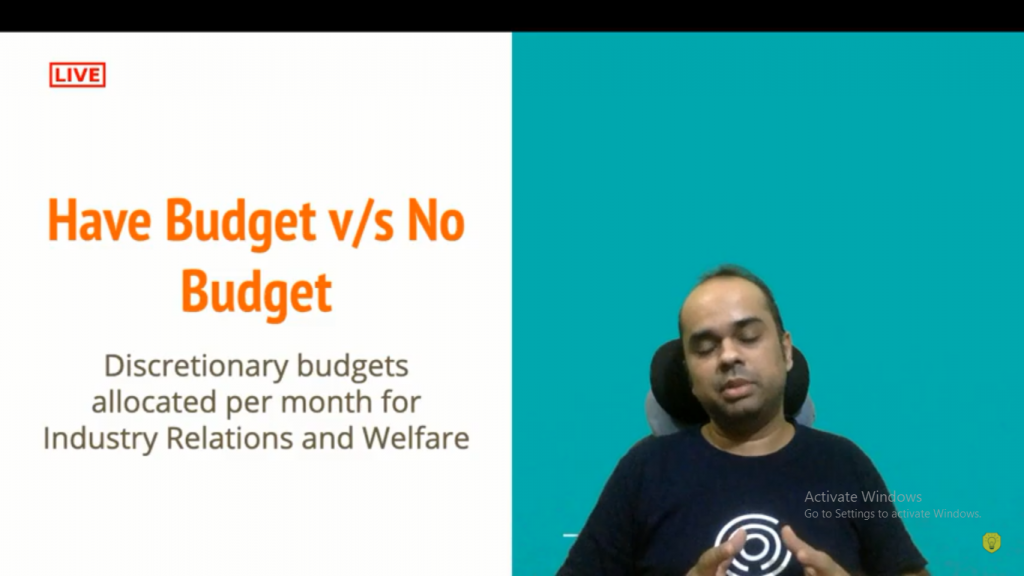
One more thing that you will very clearly see is there are training placement officers who have budget and there are training placement officers who do not have budget.
These are budgets which are in addition to their compensation on their salaries, which the college typically bears where an amount is given to these training placement officers which then they can spend on industry outreach on investments, for the training placement office, for general welfare activities, you know, that people come and visit them.
So there are people who will only reach out to you when placing some but there are people who will reach out to you all around the year for speaking opportunities for interactions for hackathons, for internships, for placements, for winter internships, for in general you know much more value added collaboration.
So, there are people who have that kind of focus that does not necessarily stem from budget, but you will clearly be able to notice this particular part where there are people who are very well defined with respect to the outlay of hospitality, outlay of you know, budget and discretionary spend and general welfare of the people who come and visit. So, this is something that you will be able to visibly see on campuses.
Very importantly, you will have people who are you know, previously some sort of enrolled in human resources, business development, sales, military, Army, Navy, some sort of a background in the private sector or some sort of a government body where they were having a very outward facing kind of role.
And now they have come out with academia, where we have assumed the role of a training placement office. This is not at all a very uncommon effect, in fact, it is something to be seen every forth college you know, looking for a person probably 15 to 20 percent of people are from the same background.
It has its own pros, people are more outward focused and they are just focused on solving a particular problem people who have some sort of a learning and development background in HR background during a very strong flavour of you know, skilling, people who are from bizdev background they will have a very strong orientation of signing MoUs, partnerships, bringing a trading partners on some subsidy basis, so on so forth.
People who are from Army or Navy kind of background, they were very strong with respect to bringing in discipline, bringing in values, bringing in the structure processes into the whole function.
And then there are people who are grown internally in architecture, so a person typically has grown from a TPC and TPO for the whole department to possibly be a part of the core team and then slightly higher and there’s a parallel learning that the professor also has the person is assuming various academic positions in right from associate, adjunct, professor, HoD, vice principal. So it is a parallel journey for these professors. So that’s what we have here.
Outbound v/s Inbound
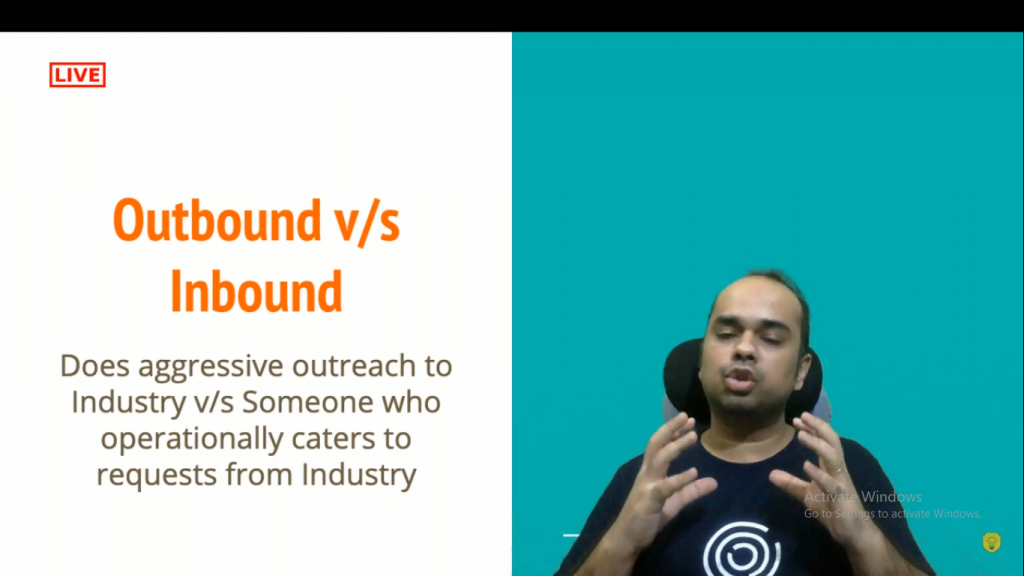
This is more of an orientation. There are people who clearly outbound who are, you know, reaching out to the companies that are very interested, they will reach out to you using LinkedIn, they will have a team of students they are in power they are reaching out, whether it’s the college which is very well established, and has such a strong pedigree where companies naturally gravitate towards these colleges.
And all you need to do is operationally optimise so that you deliver an awesome experience, right from the company approaches you registers gets day zero, day one, day two kind of a slot, when they are on campus when, you know, even the students away, and they’re off campus and orchestrating the whole experience
But it’s a different orientation, whereas there are colleges which are growing up and coming, which have their own set of challenges, and they need to grow. The need for growth is extremely strong. In that case a very strong outbound oriented training placement officer is a must and can make a tremendous difference.
And I’ve seen this actually, I’ve seen the colleges grow over a period of you know, four to six years. And placement figures are completely flipping changing making a tremendous difference.
MoUs v/s Placement
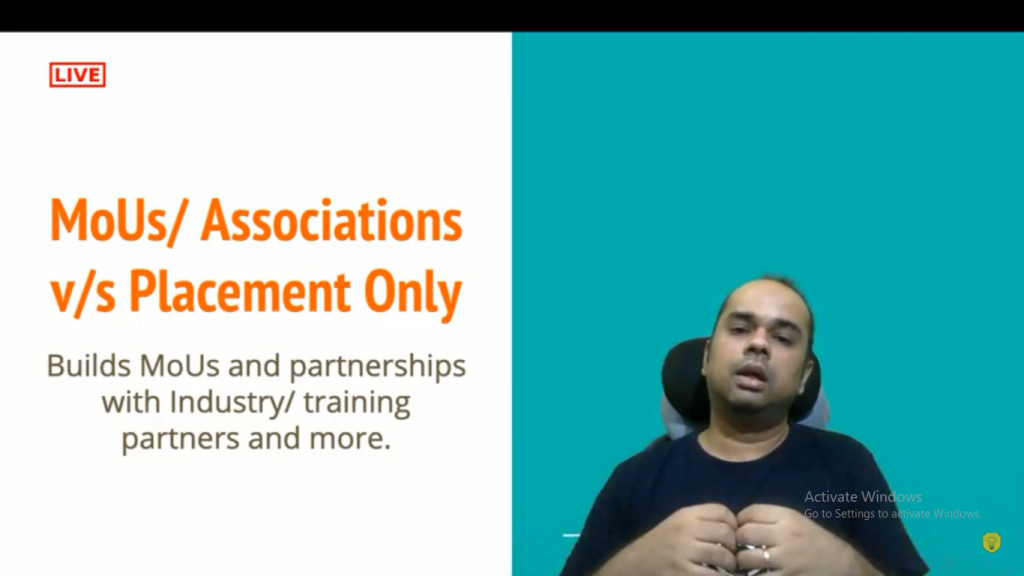
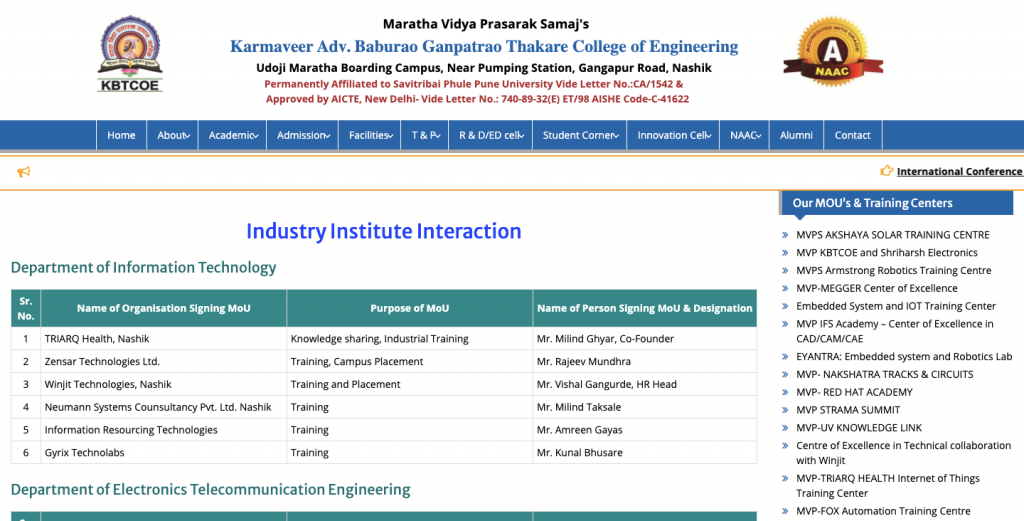
There are training placement offices who have different mandates, one being training placement. And the other can be, signing up MoUs bringing in value added partners, you know, you want to sign up with people who have given you academic tools and doing fairs, having a very strong CV with respect to the college festivals, tech fairs, building something.
So associations, partnerships, and MoUs are very important. College has training placement officers who have a very strong say when it comes to NAC accreditation, or the NBA record processes that happen in some of the Indian colleges. So because of some of the activities that these people do, it just moves the needle very significantly with respect to the scoring and grading.
So this is increasingly a larger mandate that all the training placement officers have to assume. But you will come and see this particular thing that there are people will just focus on placements. Monitoring one more point over here.
To an outsider, it might seem that placement is a season, but it is a year-long activity where there are companies that come in specific slots, like top four IT recruiters in India in a normal year. A normal year would typically start hitting the campuses somewhere in the month of May, June, July, and they have the National Grid level test and they get the campuses converted.
And then there are I would say the top 25 IT companies will typically come where they have a very clearly well defined set of projections and they hire till December. And then there is a whole host of companies which essentially want to onboard people with immediate effect or can wait for one month.
So that’s like, slightly different size of companies. But yeah, and there are these companies which are doing backfilling lateral placements, joint campuses that typically happen in the January to May kind of a season. So placement is a year long kind of a process.
Coming back to this one, it is not that people who are getting training placement officers to placement for three months or four months, and then they do MoUs and associations, I think it’s a parallel activity. There are some genuinely gems or dynamic individuals who will practice and make us very tempted to take some names of people who’ve done some awesome work. But as a rule, I’m not going to add in this particular video.
#background #matters
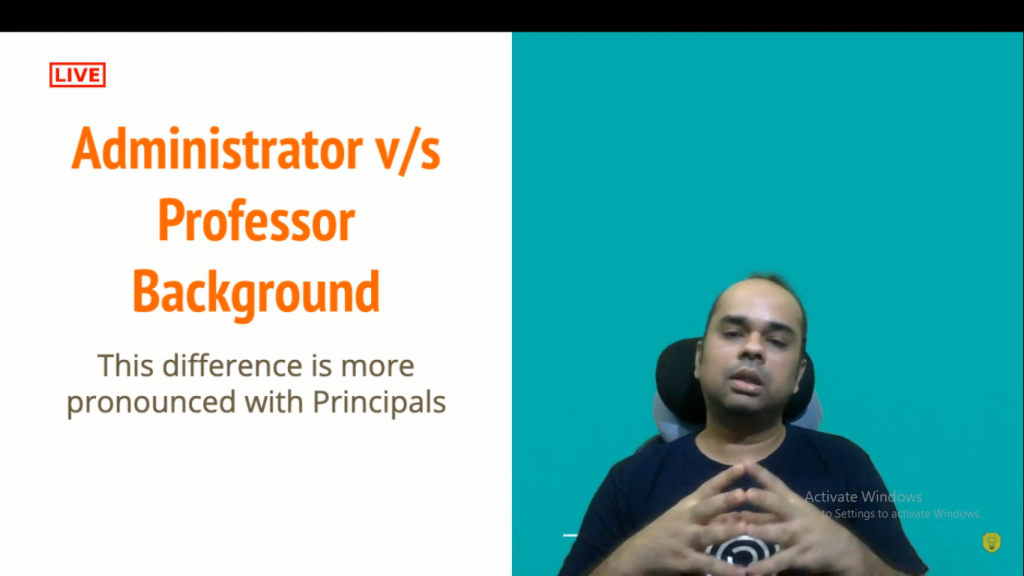
People who have some sort of administrative background versus professorial background. This quality is more pronounced when you can interact with principals.
There are principals, you know, whom you can sit down with and they will come in and discuss with you why the college should become autonomous or nonautonomous? What do you see? How do you perceive it as an industry? And there are people who will, you know, directly come to the point where, you know, this is what we have with respect to the subject matter curriculum, the number of PhDs and so on and so forth.
And there are people who have different minds. I have thoroughly enjoyed interacting with principals from both the backgrounds. Principal who has kind of grown or a training placement office who has kind of grown from a professorial background brings a very rich experience with respect to the training component specifically
These people, the professor’s also in their capacities to some sort of industry outreach formally to their colleges, also take them industry projects. So they have a very good balance with respect to what the industry is expecting? And what is it that students want? Because they are plugged into their aspirations and what is the flavour of the season types. Plus, they know what is the value of education, it’s a very good balance.
Some are from the administral background, typically, it comes with a team structure process, operational efficiency. Plus, I think, you know, they hit the numbers, but in a very different kind of be. Someone with an administrators mind, I think it is a very potent combination. It happens, I’ve seen this, and this really happens.
Great, there are training placement officers who have the necessary authority to operate within a particular spectrum. They have a very well defined, you know, degree of decentralisation where they’re able to take decisions independent of the trustees board, or the principle.
And on the flip side, there are training placement officers who are the face of the function. But essentially, their decision making is completely centralised, with the principal or higher ups.
And this is a fact of life. And I think it just requires that you understand what are those nuances across a particular campus, and then be able to drive to the point with respect to you know, taking your product service, job offering, placement, to the right stakeholder within the college.
So that is something that is very, critical, if you’re able to understand this particular dynamic on campuses is going to be very interesting and valuable.
Good v/s Bad
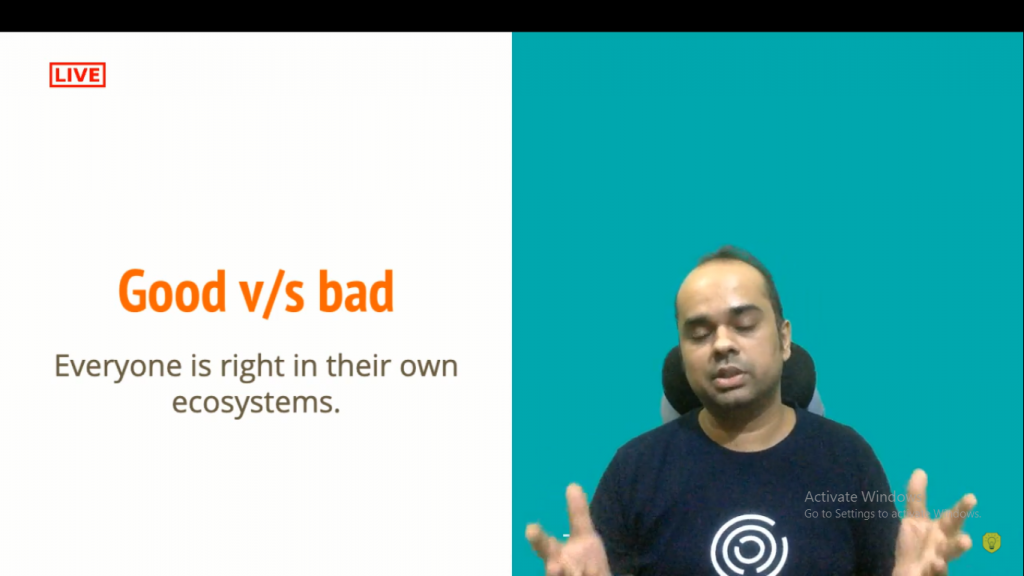
So I just want to wrap up over here. There’s nothing right or wrong in what I’ve said, there’s nothing good or bad. And I just want to drive home the points but just to bring out the whole thing that choice A versus choice B, A is always good, B is always bad, B is always good, A is always bad. It’s not like that.
Life ‘s fuzzy choices are fuzzy. And the taxonomy operable here is just to help you structure your thoughts with respect, okay, if you are a academic or visitor function or if are a business function, and if you need to approach them for whatever reasons, how do you kind of, you know, understand what your what’s happening right here.
Everyone has their space in the rightful ecosystem, and each one of them is creating impact, you know, in a very interesting way in the respective organisations and colleges. And that’s a beautiful thing.
Last but not the least I think, in my experience of having spent a lot of time with the training placement offices all across the state in Maharashtra, Karnataka and Tamil Nadu.
These particular states, one thing I would say is that you will come across people with extraordinary grid, great dedication to their cause. People who want the best for their students, mission focused individuals who want to get some numbers achieved, for the college, for the administration, but most importantly, for the students.
Last parting comment that the training placement offices are very potent individuals. The officers are very potent, they can create significant impact within the campus ecosystem and say that they have with respect to creating an impact with shaping the career of an individual or shaping a career of a prospective student who’s going to become an employee in the industry, is you humungus. And I think they can shape in a very significant way.
This is not to put the contributions of the teacher at level two. But these people essentially are some sort of a finishing school in themselves. They are the window from college to the outside world, they essentially reorient the college with respect to what is happening outside. So this particular college makes a tremendous impact.
The kind of the respect, some of these people come on, and not just in tier two cities where if someone gets a job, you’re not just securing a job for that particular person, but you’re securing income source for the whole family.
So I think the very first status that some of these people enjoy in tier two or tier three kind of a college setting, but also in tier one because it is the kind of impact this office can create. And having seen that firsthand, I think it is a very interesting and compelling role for any individual in the college and hats off to all these people.
Hope this video comes out as an introduction as just a very, mild, progressive simple introduction to what the training placement officers and training placement office is, in this particular state, specifically in Maharashtra, where I have the maximum exposure and help you possibly structure out your thoughts.
Let me know you know, what are your interpretations? What are your thoughts with respect to this video, and I will keep coming back to you with more and more interesting such videos on EdTech on product, on delivery design, and campus.
Thank you so much. The best way to reach out to me is LinkedIn. So do follow me and I’ll see you soon. Thanks. Bye.
Photo by Lukas from Pexels.
Join to get sneak peek into what's happening
I write about books, experiences, product, UX, EdTech, early stage growth, validation – mostly tech. Subscribe if these topics interest you. Once every 15 days emailer. I promise – No spam. (I am known for it otherwise) 😉




